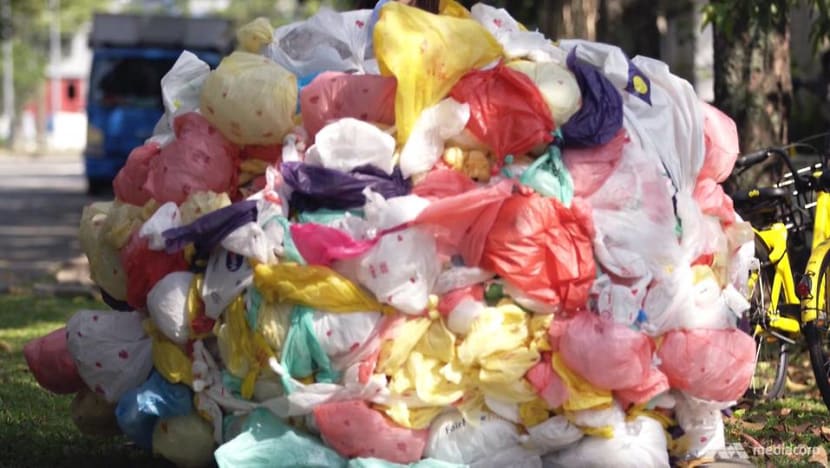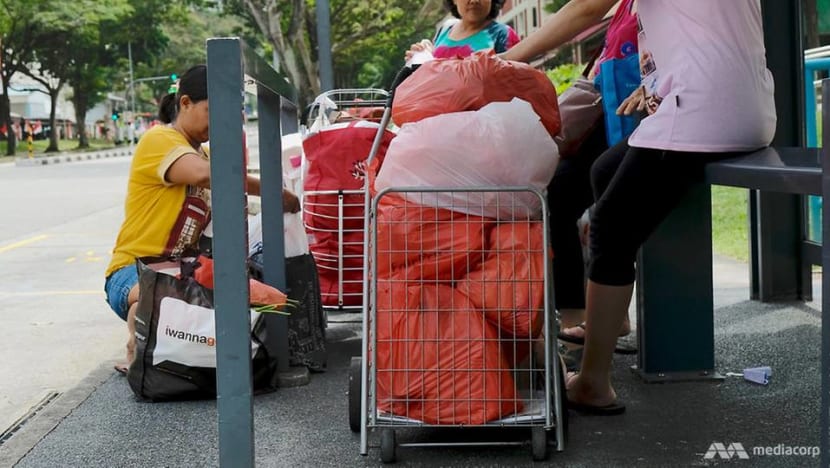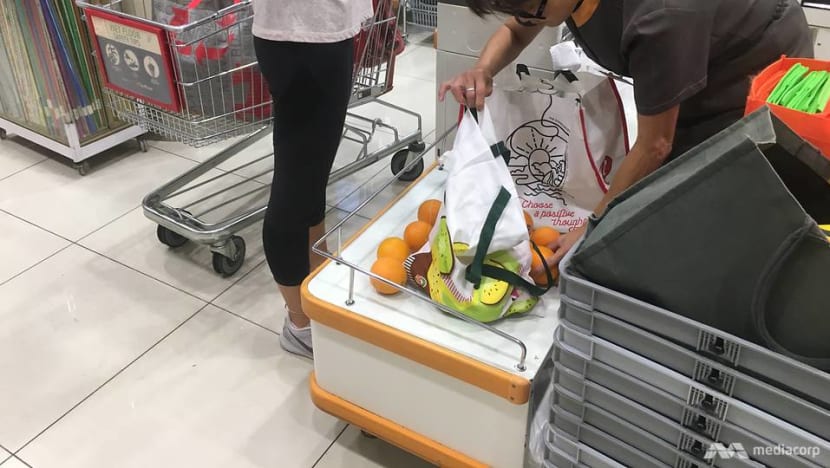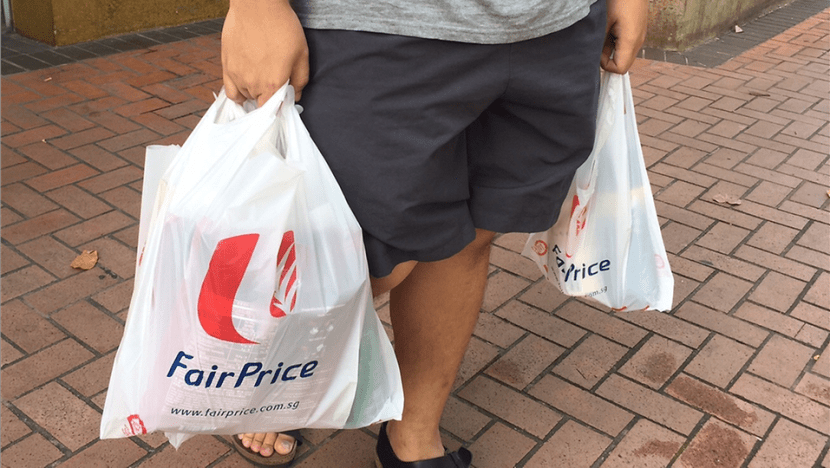commentary Commentary
Commentary: A case for making plastic bags in Singapore ugly – or even embarrassing
Singaporeans have come to see plastic bags as an entitlement and an expected part of retail service, says NUS Business School’s Sumit Agarwal.

File photo of plastic bags.
SINGAPORE: It only seems like yesterday Singapore made a strong bid to stem the use of plastic bags.
Last November, NTUC FairPrice rolled out a S$0.20 plastic bag charge to 25 outlets; a move its CEO said is “not a small step for Singapore”.
Yet after months of a deadly coronavirus, talk about kicking that addiction has gone silent. Did our guilty conscience about how many plastic bags we used for take-outs and deliveries during the circuit breaker silence us into complicity?
READ: Commentary: Here’s what months of food deliveries and takeaways have taught us
READ: Commentary: The enormous growth of plastic packaging as take-outs and food deliveries surge must stop
MOUNTING GLOBAL AWARENESS
No doubt there is mounting global awareness of the environmental impact of our addiction to plastic. Flimsy single-use plastic bags in particular have been labelled as one of the biggest polluters, and Singapore, one of the world’s biggest offenders.
According to one recent study, more than 2 million plastic bags are taken from our supermarkets every day – and that’s not even counting the many millions more taken from hawker stalls, wet markets, food delivery firms and the rest.
Across the world, cities and countries have been stepping up in phasing out the use of plastic bags, either through imposing a fee or banning it.
On Jul 1, Jakarta implemented a ban on single-use plastic bags, while Japan imposed mandatory charges for them.
Since March, customers in New York City are no longer issued single-use plastic bags, and have to pay a US$0.05 fee for paper bags.
READ: Small traders, manufacturers feel the pinch as Jakarta’s single-use plastic bag ban kicks in

However, the vast majority of countries around the world still provide plastic bags for free. Singapore has hesitated to crack the whip on single-use plastics, relying instead on corporates and people to self-regulate.
The Government has said that Singapore’s approach should account for an urbanised and high-rise living context, noting that plastic bags aren’t “single-use” when reused for disposing rubbish.
This seems like a prudent strategy when you consider that Singaporeans may not be so receptive to tougher measures. A 2019 survey revealed that just 9 per cent of Singaporeans wanted a plastic bag ban, while another 21 per cent preferred a charge.
Part of the challenge, campaigners say, is that we have come to see plastic bags as an entitlement and an expected part of the retail service.
READ: Commentary: Recycle or reduce waste? Why Southeast Asia’s ocean plastic pile has no easy answers
LISTEN: Repairing and recycling to reduce e-waste: A pipe dream in Singapore?
So if a plastic bag ban or extra chargers are out of the question, what could help us kick our addiction to plastic?
The field of behavioural economics may offer some answers. Incentives, persuasion and psychological “nudges” are some of the many tools used to change consumer behaviour – from encouraging us to eat more healthily, to saving energy or taking public transport instead of the car.
TRADITIONAL MEASURES
Economists often resort to the age-old solution of adjusting prices to shape behaviour. Increasing prices should make demand drop.
In the UK, a law introduced in 2015 requiring supermarkets to charge for bags has led to a 90 per cent drop in single use bag consumption.
But is a plastic bag charge the correct approach in Singapore? Not everyone is sensitive to small price rises. Even with Singapore’s penchant for thriftiness, many consumers who have become used to the convenience will not find a few cents a significant enough imposition to change their habits.

Some may justify taking bags from the supermarket on the principle that the bag can be reused to dispose of household rubbish – although of course it inevitably ends up in landfill. At the rate we’re going, Semakau, Singapore’s only landfill, will run out of space by 2035.
What about banning plastic bags entirely? Facing growing plastic pollution in its oceans, Thailand introduced a ban on single use bags, beginning this year with large retailers but to eventually cover all shops.
READ: Commentary: Thailand gives up plastic bags yet leaves rampant consumerism intact
But whilst such measures might make governments appear decisive and tough, history tells us that banning particular products only creates other problems. The US Prohibition in 1920 did not stop the production or transportation of alcohol, but only created a black market fuelled by organised crime.
While it may seem unlikely that there would be a black market for plastic bags, Singaporeans may go online to buy them, or stockpile before the prohibition kicks in.
READ: IN FOCUS: 'It is not easy, but it can be done' - The challenges of raising Singapore's recycling rate
MESSAGING AS A POSSIBLE APPROACH
Might the key to ridding us of our plastic addiction lie in making the use of plastic bags shameful? Authorities have applied such reasoning to cigarettes.
Images of lung disease and warning signs have covered cigarette packaging. Many countries mandate the use of brand-free designs, high impact health warnings and disturbing images of diseased human organs to shock or shame smokers into giving up.
Smokers too in Singapore have been relegated to smoking in yellow boxes in public spaces.
This may sound confrontational for plastic bags, which are unlikely to directly damage the health of the consumer or their family as, say, smoking does. Yet consider how widespread and effective the opposite, positive messaging has with regard to environmentally-friendly alternatives.

For example, reusable shopping bags frequently tout their green credentials through words and bright imagery printed on them.
Likewise, low-emission hybrid cars often display the word “hybrid” prominently on their sides, helping to convey the environmental awareness of the consumers who buy them.
Cynics may dismiss such practices as mere virtue signalling. But if it works to persuade consumers to buy a particular product, could negative messaging also be used to change their habits away from another product, even if it is “free”?
READ: Commentary: Wasteful practices of affluence must stop
As social animals, we are susceptible to and influenced by what others think of us. If our actions put us in bad light socially, we will usually try to change them.
Printing confronting messages such as “this bag is a polluter” on bags, or images of litter clogged beaches and animals that have died as a result of plastic pollution might shift behaviour and dissuade consumers from taking single-use bags.
The logistical challenge to get that done may not be insignificant, but the financial cost of such printing would be negligible. By attaching themselves to an increasingly popular social cause, supermarkets and retailers also stand to gain in the eyes of their environmentally concerned customers.
LISTEN: Repairing and recycling to reduce e-waste: A pipe dream in Singapore?
NUDGING PERCEPTIONS
This is not to argue that a cigarette pack-style approach alone would be a magic bullet solution to plastic bag use. Shifting consumer behaviour away from the convenience of single-use bags will require a combination of measures to bolster awareness of plastic usage and its impact, reinforce its social unacceptability, and make its use less convenient.
Placing bags at a distance from the checkout counter, for example, and training cashiers not to offer bags unless specifically requested could also help support the message and make their use less convenient for the consumer.

Together these and other measures can help raise the psychological cost of using plastic bags, adding an element of social embarrassment or shame for the consumer and nudging them towards using alternatives.
As a way of kicking our plastic bag addiction, such steps could be far more powerful and lasting than simply charging a few cents for each bag.
Sumit Agarwal is the Low Tuck Kwong Distinguished Professor of Finance, Economics and Real Estate at NUS Business School. He is also the author of Kiasunomics and Kiasunomics2. The opinions expressed are those of the writer’s and do not represent the views and opinions of NUS.















